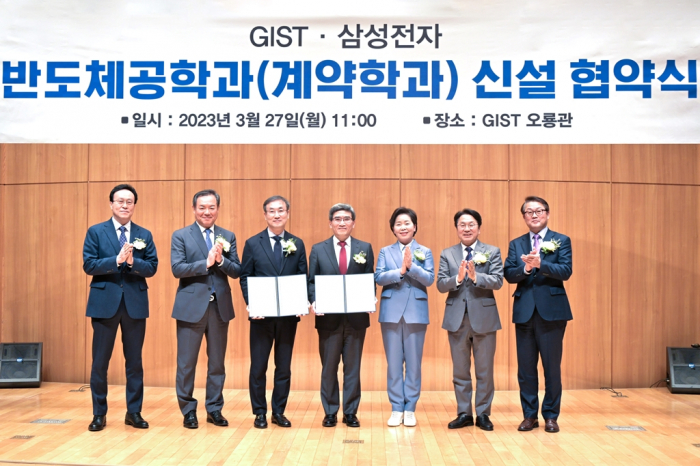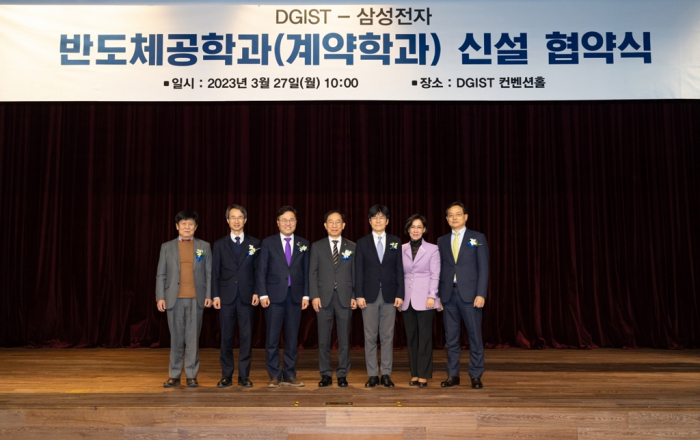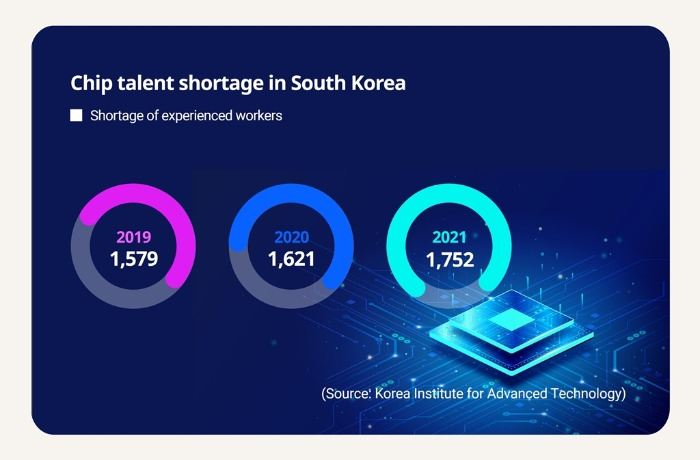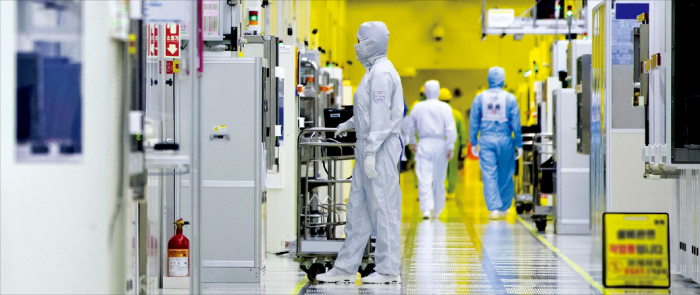Korean chipmakers
Samsung accelerates nurturing chip talent at tech universities
Amid an intensifying chip talent hiring war, universities and chipmakers are jointly launching courses to train engineers
By Mar 27, 2023 (Gmt+09:00)
3
Min read
Most Read
LG Chem to sell water filter business to Glenwood PE for $692 million


Kyobo Life poised to buy Japan’s SBI Group-owned savings bank


KT&G eyes overseas M&A after rejecting activist fund's offer


StockX in merger talks with Naver’s online reseller Kream


Mirae Asset to be named Korea Post’s core real estate fund operator



Samsung Electronics Co., the world’s largest memory chipmaker, is expanding programs to foster talented semiconductor engineers and experts by launching more chip-related courses at tech universities in South Korea.
The Korean tech giant said on Monday it has signed deals with Daegu Gyeongbuk Institute of Science & Technology (DGIST), Gwangju Institute of Science and Technology (GIST) and Ulsan National Institute of Science & Technology (UNIST) to establish chip technology programs at the universities.
According to the Ministry of Science and ICT, students to be recruited for the programs will be separate from the already set student quotas for the three tech universities.
A total of 500 students will be recruited over the next five years starting next year through 2028, the ministry said.
The programs, set to begin in March 2024, will be Korea’s first integrated undergraduate and graduate courses to train skilled semiconductor engineers.

The courses will focus on advanced chip manufacturing process, design and software development, according to Samsung and the ministry.
The three universities are expected to produce a combined 100 skilled chip engineers annually – 40 from UNIST and 30 from GIST and DGIST, respectively.
FULL SCHOLARSHIP, JOB AT SAMSUNG GUARANTEED
Students on each of the programs, which take five years to complete, will receive a full scholarship. Jobs are guaranteed at Samsung upon graduation.
With the addition of the programs at the three institutes, Samsung will be running such courses at seven universities, including the Korea Advanced Institute of Science and Technology (KAIST). Samsung expects to receive 450 chip specialists from the seven annually.

In partnership with Samsung, KAIST is running a contracted chip talent nurturing course with 100 new students this year. KAIST also plans to build a chip campus in Pyeongtaek, where Samsung’s main chip plant is located, by 2026.
“We will hire 50 chip specialists as professors in addition to 600 new students at the Pyeongtaek chip campus to start programs in 2027,” said a KAIST official.
With growing demand for chip talent, Korean universities are actively launching chip-related courses across the country.
According to new student recruitment plans for 2024, Sungkyunkwan University seeks to recruit 70 for its chip system engineering department next year. Other universities with similar plans include Yonsei University (50), Pohang University of Science and Technology, commonly known as POSTECH (40), Hanyang University (40), Korea University (30) and Sogang University (30).
GIST and DGIST plan to establish semiconductor-focused graduate schools to produce at least 500 talented engineers annually from the current 220 a year.

BALANCED REGIONAL GROWTH
Samsung’s latest move, part of its efforts to promote balanced regional growth in Korea, follows the government’s decision earlier this month to nurture more youths specialized in semiconductors at high schools to ease the worsening shortage of high-skilled workers at domestic chipmakers amid intensifying recruitment war.
Three cities – Yongin, Incheon and another in Kangwon Province – said they are seeking to establish or turn vocational-technical schools into meister, or specialized, high schools to foster skilled semiconductor workers.
Samsung and crosstown rival SK Hynix Inc. have signed contracts with the Yongin city government to hire students from the specialized schools upon graduation.
Korea’s chip industry has been reeling from the lack of a skilled workforce amid criticism that the government has been slow to provide infrastructure and build a professional workforce for the backbone of the Korean economy – Asia’s fourth-largest.
Korea’s trade ministry data showed the country needs at least 1,500 new chip experts every year. Chip-related college graduates, however, totaled about 650 in 2022.
The government estimates that Korea should have at least 304,000 chip experts over the next 10 years if it wants to compete on an equal footing with its archrival Taiwan, home to Taiwan Semiconductor Manufacturing Co. (TSMC), the world’s top foundry chipmaker, and other countries such as China and the US.
Write to Jeong-Soo Hwang and Jin-Won Kim at hjs@hankyung.com
In-Soo Nam edited this article.
More to Read
-
 Business & PoliticsSouth Korea eyes $261 billion chip cluster; Samsung takes lead
Business & PoliticsSouth Korea eyes $261 billion chip cluster; Samsung takes leadMar 15, 2023 (Gmt+09:00)
4 Min read -
 Korean chipmakersKorea to raise young chip engineers for Samsung, SK Hynix
Korean chipmakersKorea to raise young chip engineers for Samsung, SK HynixMar 13, 2023 (Gmt+09:00)
3 Min read -
 Korean chipmakersSouth Korea to cut red tape, raise student quota to grow chip talent
Korean chipmakersSouth Korea to cut red tape, raise student quota to grow chip talentJul 19, 2022 (Gmt+09:00)
4 Min read -
 Artificial intelligenceKorea to invest $367 million to nurture AI, metaverse, digital talent
Artificial intelligenceKorea to invest $367 million to nurture AI, metaverse, digital talentJan 19, 2023 (Gmt+09:00)
1 Min read
Comment 0
LOG IN


